The top wine counties in the UK
Last week, WineGB released its latest industry report, which highlighted the counties with the most vine plantings across the UK. db takes a look at some of the vineyards.
Kent: 26% of total plantings
Coming in at number one is ‘the garden of England’: Kent. Unsurprisingly, this sunny, temperate coastal south-eastern county is ideal for the cultivation of grapes.
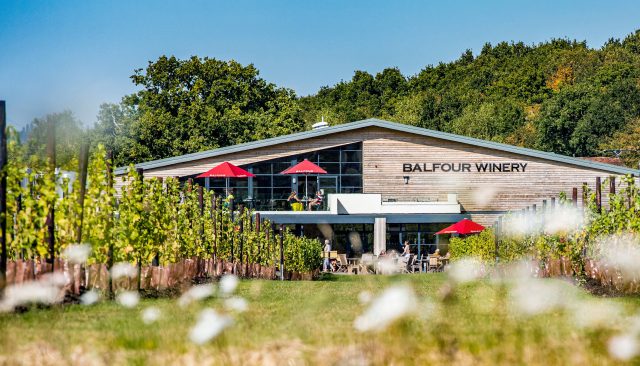
Home to Chapel Down in Tenterden and the Balfour Winery on the Hush Heath Estate, it is the location of some of the largest and most established vineyards in the country. Specialities of these two wineries include Balfour’s Brut Rose and Chapel Down’s Brut, both showcasing the quality of sparkling wine produced in England.

Also featured in the county is Gusbourne in Ashford, which also produces sparkling, as well as still, wines. The estate sits on the low slopes of the ancient Kentish escarpment at Appledore, and is sited only six miles from the coast, allowing for the marine climate to influence its wines.
Two of the oldest vineyards commercially and historically are Barnsole and Biddenden. The latter, located between Maidstone and Ashford, produces wines across a 23 acres of south-facing slopes and Barnsole, one of the the oldest vineyards in Kent, produces around 20,000 bottles a year of sparkling, white and red wines.

Also featured is Oxney Organic near Rye, which produces low-intervention organic wines. A large, single-estate producer, it makes a variety of red, white and sparkling wines.
A newer addition is Simpsons Wine Estate near Canterbury which was set up in 2014 in the Elham Valley, a part of the North Downs close to the village of Barham, and located in a designated Area of Outstanding Natural Beauty. The winery produces a sparkling Brut and a chardonnay.
West Sussex: 15% of total plantings

Home to more than 50 vineyards, and to the west of Kent comes another county which is already full of established vineyards and wineries producing award-winning wines, such as Nyetimber, the Bolney Wine Estate and Tinwood Estate.
Nyetimber owns vineyards across West Sussex, Kent and Hampshire, but its West Chiltington home has been often heralded as one of the most beautiful in the world, and recently featured as one of the most Instagrammed vineyards.
Bolney, set up by Janet and Rodney Pratt in 1972, has been a commercial vineyard for decades, with the couple’s daughter, Sam Linter heading up the winemaking team until standing down in April this year, following its sale to Freixenet Copestick, the UK arm of parent group and sparkling wine giant, Henkell Freixenet. Its estate is located on the edge of the South Downs, around 14 miles from the coast, and is made up of five vineyards.
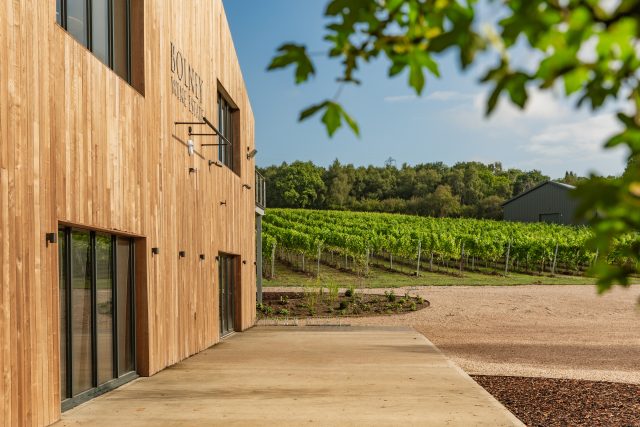
Tinwood, established in 2007 near Chichester, is run by Art Tukker and his father and mother Aad and Marjolein alongside his wife, Jody. Previously farming lettuces, the estate is now one of the biggest in the county, and was assisted in starting up its enterprise with Ridgeview Wine Estate in East Sussex.
Also in the county is Kingscote, another family-run estate based near East Grinstead. Mill Place Farm was once owned by the horticulturist and ‘father’ of the English country garden, William Robinson, in the early 1930s. The farmhouse was built in 1320 as an Iron Master’s house, and a recently-built visitor centre consists of an original 15th Century Tithe barn.
East Sussex: 13% of total plantings
Like neighbouring West Sussex, this county is full of well-established vineyards that already have a national and international footprint, such as Rathfinney and Ridgeview.

Husband and wife team, Mark and Sarah Driver, established the Rathfinny Wine Estate in Alfriston in 2010 on a working arable farm to create English sparkling wines to a high standard. Dedicated to sustainability, the company is already a registered B Corp, and following the original 50 acres of vines in 2012, it expects to have around 350 acres under vines, with grape varieties including Pinot Noir, Chardonnay and Pinot Meunier as well as a small amount of Pinot Gris.
To the north and west of Rathfinney is Ridgeview, just outside of Brighton, which has been producing wine for the past 25 years. Also a B Corp, the wine producer, established in 1995, also creates a signature range and award-winning English sparkling wine, such as a Blanc de Blancs.

Also situated in East Sussex is Charles Palmer vineyards, located near Winchelsea and near to both the sea and the border with Kent. The 35 acres of vines sit on the 120 acre Wickham Manor Estate.
Hampshire: 10% of total plantings
Sitting adjacent to the above counties and within the South Downs lies the county of Hampshire, which is home to Hambledon, another of the UK’s largest sparkling wine producers.
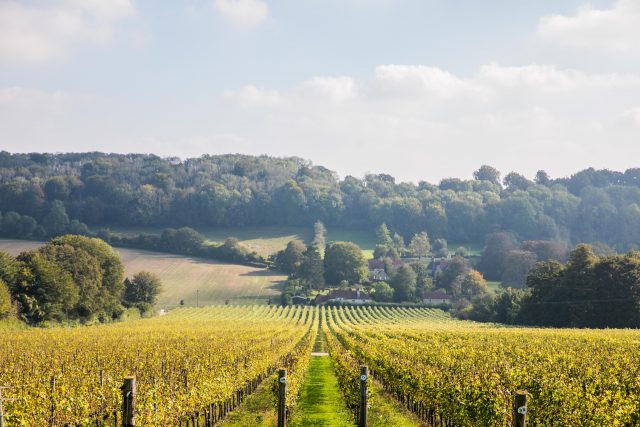
Across a 200-acre vineyard, which offers tours and tastings, the vineyard was established in 1952 by Major-General Sir Guy Salisbury-Jones, next to the ‘cradle of cricket’. The vineyard is sited on Newhaven Chalk, which is the same chalk found in the Chardonnay areas of the Côtes des Blancs in Champagne. It produces a classic and première cuveé as well as rosé sparkling wines.
Also within Hampshire is Hattingley Valley, founded by Simon Robinson and his family, who made the initial plantings in 2008, under the head winemaker, Emma Rice, who handed over the reigns to a new head winemaker, Rob Macculloch, in 2022. The vineyard produces a range of award-winning sparkling wines, including a classic reserve NV, a rosé and a Blanc de Blancs.
A new addition to the party is Black Chalk winery, which has only been up and running for a few years but has got critics excited. In 2018, it secured 12 hectares of established vineyards across three sites in the Test Valley, Hampshire, and has turned a collection of buildings into its home, including a tasting room.
Another new vineyard is The Grange, run by four siblings and which works with Hattingley Valley, on sparkling wines. Also within the county are Raimes Vineyard and Setley Ridge as well as many others.
Partner Content
Essex: 8% of total plantings
Essex is one of the many growing areas in England that are rapidly expanding.
The county also has history, and includes one of the longest running commercial wineries at New Hall Vineyard, which had its first vines planted in 1969. Located on the outskirts of Chelmsford, it supplies grapes to many UK wine producers, with grapes including Reichensteiner, Huxelrebe and Müller-Thurgau. Recently, it has also planted Pinot Noir, Pinot Meunier and Bacchus, and produces more than 250,000 bottles of wine per year.

Located near to Saffron Walden, Saffron Grange is another family-run producer creating sparkling wines, using Chardonnay, Pinot Noir, Pinot Meunier, Seyval Blanc and Pinot Gris grapes. It is also sited on the same chalk seam that runs through Northern France and through Sussex into Essex, with the team passionate about turning the ‘Saffron region’ into a renowned wine area.
A slightly older producer, established in 1997, can be found at Mersea Island Vineyard, which grow four varieties of grape: Muller Thurgau, Ortega, Reichensteiner and Solaris. The winery produce four bottles of wine which are the Blush, Summer Days, Mehalah and Island Dry.
A younger vineyard is found near Halstead; Tuffon Hall, a family-run winery set up by Angus and Pod Crowther in 2014. Producing Rosé, Bacchus and sparkling wine using the traditional method.
Other vineyards include the Bardfield Vineyard in North Essex, which has been producing wine for nearly 30 years and the Crouch Ridge Vineyard near Chelmsford, which has 15 acres planted with three varieties of grapes: Chardonnay, Pinot Noir and Pinot Gris.
Surrey: 3% of total plantings
Surrey’s plantings are dominated by the largest vineyard in the UK, Denbies, located near to Box Hill and Dorking, and taking up 265 acres of land with a production capacity of one million bottles. Founded by Sir Adrian White in 1984, and continually family-run, it is one of the largest family-owned wine producers in the UK
Denbies makes a wide variety of wines, alongside its award-winning sparkling Cubitt Blanc de Noirs, and also an Orange wine made from 100% hand-picked Solaris. It also makes sweet wine from botrytised Ortega grapes.
In addition to its wine production, the vineyard has a hotel and restaurant facility.

Denbies forms part of the Surrey Hills network of vineyards, which includes smaller scale local producers such as Greyfriars outside of Guildford, Chilworth Manor, and Albury Organic Vineyard and High Clandon.
Gloucestershire: 2% of total plantings
Three Choirs Vineyards is another old vineyard, beginning its life in 1973 when local wine retailer Alan McKechnie started harvesting the vines on his small fruit farm. It was subsequently taken into the ownership of John Oldacre who grew the vineyard to more than 70 acres and it remains largely in the hands of his family today. The wine producer is named after the Three Choirs Festival, England’s oldest choral festival. In 2014, it purchased the Wickham Vineyard in Hampshire, adding 40 acres and buildings to its estate. The vineyard produces a number of sparking wines, a rosé, a Bacchus and other popular varieties.

Another popular destination winery is Fiona and Niall Shiner’s Woodchester Valley vineyard. Following time in Hong Kong, the Shiners returned to Britain, and Fiona Shiner planted some vines with the first acre in 2007 becoming a pathway to the current 58 acres. An additional vineyard site at Stonehouse was acquired, bringing the total area under vine to 58 acres, producing a range of sparkling and still wines.
Devon (2% of total plantings)
Many of the vineyards in Devon are still growing or recently planted with the past decades and it is an evolving wine region.
Sandridge Barton is one of the county’s most significant players, being the new home of Sharpham Wines, with its Dart Valley Reserve formerly being the first English wine to be selected as Co-op’s own brand English wine. Located near Stoke Gabriel, the producer has created a new winery and completed its first harvest in 2020 with its visitor centre opening its doors in June 2022.
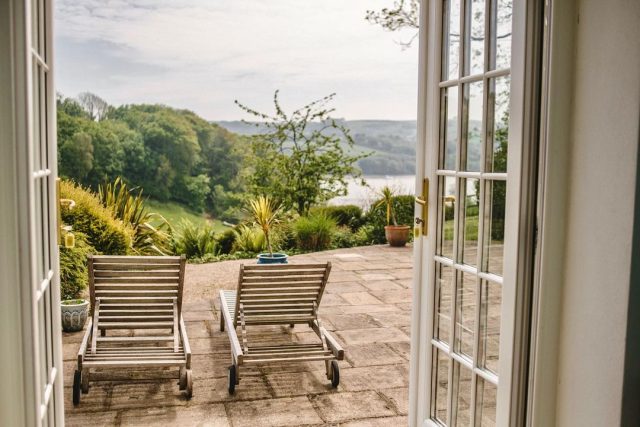
Calancombe Estate makes wine from its own grapes, as well as producing a Dartmouth English Gin, and its own ciders, cassis and apple brandy.
Lyme Bay Winery, like Calancombe, combines sparking and still wine with producing fruit wine, cider, mead, liqueurs and spirits within the county’s Axe Valley. It has been established for more than 30 years, and has produced a number of award-winning wines, including a Pinot Noir.
Other vineyards include small family-run producers which are situated throughout the county, including near to Dartmoor.
Dorset: 2% of total plantings
A number of well-known vineyards can be found in Dorset, the county which contains the Jurassic Coast World Heritage Site. The Furleigh Estate covers 85 acres just outside of Bridport, producing the classic Champagne grapes of Chardonnay, Pinot Noir and Pinot Meunier. The wine producer has a range of sparkling wines, as well as Bacchus and Rondo to create still wines.
The Langham Wine Estate near Dorchester also produces a range of sparkling wines. The first Langham vineyard was originally established at Bingham’s Melcombe manor house by John Langham as a hobby before his son Justin Langham, developed it into a commercial venture, planting 30 acres of vines at Crawthorne Farm, a few miles down the road.
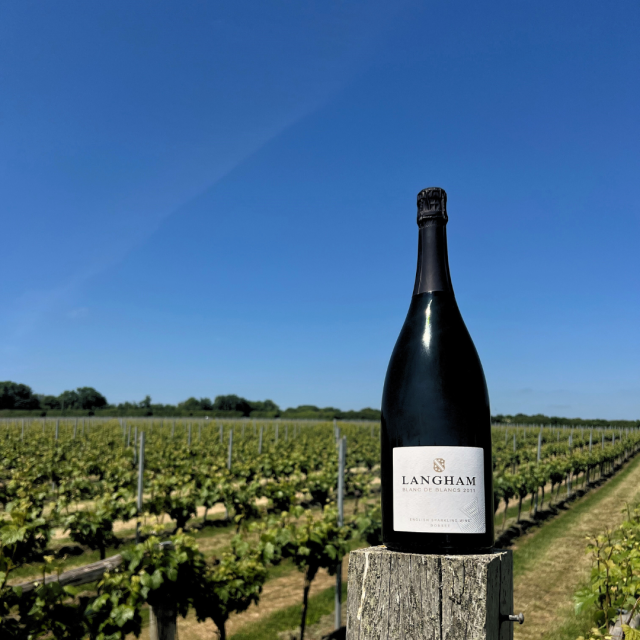
Also in the county is the English Oak Vineyard near Poole, a 23 acre family-run winery creating sparkling wines. The vineyard has 23,000 vines surrounded by English oaks, hence the name. Another similar size winery is The Bride Valley Vineyard, which sits between Weymouth and Bridport, and was set up by couple Arabella and Steven Spurrier on the family’s sheep farm. The vineyard produces three sparkling wines. Spurrier, who passed away in 2021, was something of a wine expert and responsible for the infamous Judgement of Paris tasting.
Related news
Domestic growth and premium demand drive UK wine market
‘Business as usual’ for Ridgeview as English sparkling wine producer enters administration
‘We are crazy’: Gusbourne tasting shows the ambition behind English wine’s rise




